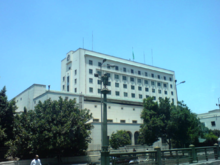Arab Parliament
The Arab Parliament ( Arabic البرلمان العربي, DMG al-Barlamān al-ʿarabī ) is an institution of the Arab states. It was set up at the 2001 Arab League Summit in Amman, under the leadership of Secretary General Amr Moussa .
In 2004, at a summit meeting, all members of the Arab League agreed to send their representatives to temporary parliamentary sessions, which initially took place at the headquarters of the Arab League in Cairo .
At the moment [out of date] (as of August 2012) the parliament is still under construction.
The headquarters were in Damascus until the meetings were suspended on May 22, 2012 and temporarily relocated to the League headquarters in Cairo . The Arab League is now preparing to move the seat of parliament to Baghdad .
Mishaal bin Fahm ( Saudi Arabia ) is the incumbent President of Parliament.
history
Since the 1950s there have been discussions within the Arab League about direct citizen participation , but the pact of the League of Arab States did not provide for this. A first step in this direction was the establishment of the “Arab Inter-Parliamentary Union” (AIPU) in 1977, whose task it was to control the political work of the various national parliaments. In the following years, the AIPU and the General Secretariat worked on drafting a parliament for the Arab League. At the 2004 League Summit in Algiers , it was decided to found an “Arab Parliament”. The aim was to be a voice for the citizens of the Arab world alongside national governments. This would also make the league more democratic in its decision-making processes. Until 2007, the majority of the members agreed, the final decision on the implementation is currently still with the League Council . A "transitional parliament" met for the first time on December 27, 2005, to lay the foundation for a permanent parliament. His mandate ends in December 2012. [obsolete] At the moment, the Arab Parliament is in a state between transition and permanent establishment.
composition
The current chairman is the Kuwaiti Ali Dekbas [obsolete] . He is elected for 3 years from among the members of the parliament. It is currently still meeting in Cairo, but it is expected to move to the Syrian capital Damascus as soon as the headquarters there is completed. It is currently unclear to what extent the civil war there and the provisional exclusion of Syria from the league make this plan appear realistic. There are two annual meeting periods in March and September, each lasting two months. The parliament consists of a bureau , which takes care of external affairs, a parliamentary office, which is entrusted with administrative tasks, and four committees with various political departments.
The system of citizen representation has not yet been implemented, rather the 22 national parliaments each elect 4 delegates from their own ranks who take part in the sessions of the Arab Parliament; the total number of MPs is therefore 88. The mandates of the MPs there therefore only end with the dissolution of the national parliaments or if they do not remain in the national parliament.
The MPs of the AP are not to be regarded as representatives of their national parliaments or their governments. Rather, they represent the "Arab Nation" (the definition of this term is still unclear) as a whole, so theoretically they can only follow their own conscience .
So far this institution has not taken an active role in Arab politics. However, this seems to be changing at the moment: Parliament clearly criticized the regimes in Yemen and Syria. President al-Dekbas even called for the membership of both countries to be suspended. As a result of these advances, Syria's membership in the Arab League is currently rests, mainly at the instigation of al-Dekbas.
Individual evidence
- ↑ FaceOf: Mishaal bin Fahm Al-Salami, president of the Arab Parliament. In: aroundworld24.com. July 8, 2018, accessed March 7, 2019 .
- ↑ Rania Abouzeid: Syria: How the Arab League's Monitors Are on a 'Mission: Impossible' Time Magazine online, January 2, 2012 (English)
